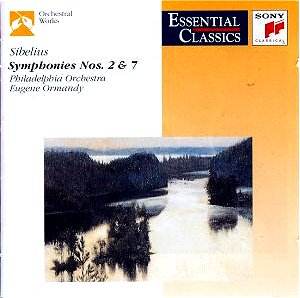Ormandy is no mean Sibelian as many of us who developed
our interest in classical music discovered when his 1979 EMI LP of the
Lemminkainen Legends was issued. This was, and is, perhaps the
best performance on record or at least the best I have heard so far.
He tackled the Second Symphony several times.
His final sally was on RCA in a surround-sound effort (circa 1975) later
reissued in 'ordinary' stereo on an RCA Gold Seal LP and then on
a now deleted RCA Navigator CD at bargain price. This earlier CBS (now
Sony) version recorded in the year of Sibelius's death and not long
after Ormandy's pilgrimage to Järvenpää, sounds frankly
wonderful. String tone (one of my obsessions) is very good - generous,
open, natural. His woodwind often sound very idiosyncratic - at 2.20
in the tempo andante it has harmonium overtones suggestive of
the instrument for which several of the composer's domestic juvenilia
were written.
This is a very good and extremely imaginative version
which has more high profile spark about it than Ormandy had in his 1940s
First Symphony (Biddulph). The orchestra are on great form - try little
details like the ever-entwining flutes at the end of the Vivacissimo.
I have never heard the flutes played with such seeming defiance of the
human limitations of breath and this comes into play again at 10.35
in the allegro moderato.
Ormandy, when compared with Maazel (VPO/Decca), is
regal where the Viennese partnership is extremely exciting in much the
same way that Mravinsky and the Leningrad PO might have been had they
recorded the Second in the same Deutsche Grammophon London sessions
as those dedicated to the last three Tchaikovsky symphonies.
The Seventh Symphony is a much tauter and more
intense document than the contemporaneous EMI Beecham recording.
Ormandy dives into the work holding up to the light so much more drama,
skirmish and chilly seduction than one often finds in approaches to
this work. The symphony is very prone to soft-contoured unemphatic exegesis.
That way lies the routine and the ordinary. Ormandy is having none of
that. What we get is a performance that could easily have been the model,
in many places, for Mravinsky's Melodiya in Moscow in 1965. The trombone
is more couth of tone and the strings do not have that balsamic tight-throated
desperate tone that the Leningraders have but otherwise there are surprisingly
many similarities between two recordings looking at each other across
the gulf of the Cold War.
Hiss - that legacy of analogue origins - is evident.
Not wanting to sound too much like an enthusiast of hiss, but when heard
with concentration, it is not as even-sounding as the hiss to be found
on the 1964 Decca recording of the Second Symphony (VPO/Maazel). Perhaps
there had been some degradation in storage or the original tape stock
was of a different quality to that of the early 1960s Decca material.
It is no big deal just noticeably different.
I have been hearing a lot of Sibelius recently but
I will want to return to this disc again and I will do this with pleasure.
I hope you will be encouraged to buy this.
Rob Barnett


